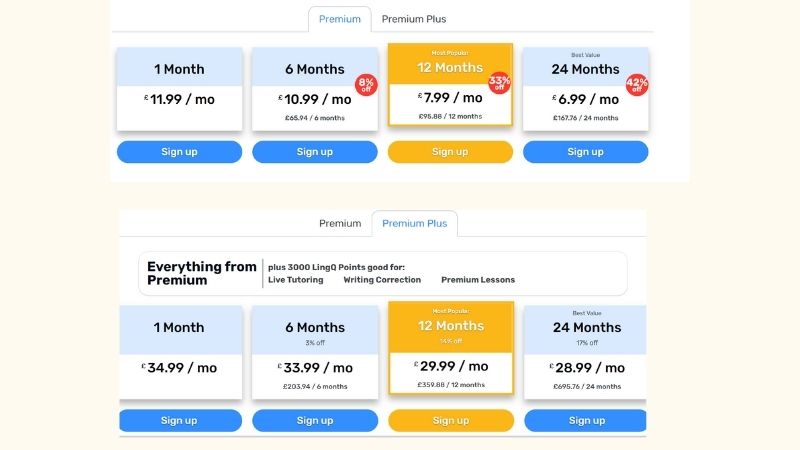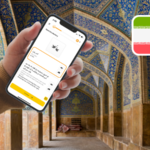How important is it for you to find the right language learning app? Let’s face it, what with the rising cost of living thanks to inflation, it’s becoming more and more difficult to part with your hard-earned cash, which is why it’s so important for you to make an informed decision. Hence, that is why we’re bringing you FluentU Vs. LingQ
Note: This review will cover basic information about each app, pricing, pros and cons, and a final decision about what I think you should opt for.
Come over, begin your language learning journey, and join Ling‘s language learning community.
About FluentU
The key feature of FluentU is that it is largely a video platform. There aren’t the other multimedia elements you might find with the likes of Duolingo or Rosetta Stone. FluentU takes video content from Youtube and incorporates it into content such as quizzes. This has led some on the internet to describe FluentU as a ‘supplementary app.’
About LingQ
For me, LingQ feels like the language app most favored by dedicated connoisseurs of the genre. If you have zero knowledge of a language, I can’t help but feel LingQ would be the wrong way to explore it.
LingQ is based on reading. You are presented with an article, and you have to either tick or untick words you’re comfortable with identifying. Any words you’re unsure of become LingQs (unknown words) that are presented back to you as SRS flashcards that improve your vocabulary-building tools.
Its biggest strength is that you can import youtube videos and articles from anywhere on the internet and create your lessons out of them.
FluentU Available Languages
Spanish. French. Italian. German. English. Russian. Japanese. Mandarin Chinese.
LingQ Available languages
| Dutch | Esperanto | Belarussian | German |
| Japanese | Portuguese | Greek | Latin |
| Spanish | Arabic | Korean | Russian |
| Polish | Ukrainian | French | Italian |
| Chinese | Swedish |
Available In Beta:
| Turkish | Romanian | Malay | Cantonese |
| Persian | Hungarian | Czech | Finnish |
| Indonesian | Dutch | Gujarati | Serbian |
| Catalan | Norweigan | Hebrew | Slovak |
| Chinese (traditional) | Bulgarian | Croatian |
FluentU Pricing

LingQ Pricing

FluentU Pros And Cons
| Pros | Cons |
| One subscription gains you access to all languages | Very expensive compared to other apps |
| Because the app is mainly video; it’s great for visual learners(some estimates put that percent of learners at 65%) | Limited amount of languages |
| Extensive Video library including movies, cartoons and music videos | No conversational practice(speaking is so important) |
| Impressive amount of detailed supplementary material | U.I looks slightly outdated compared to say Pimsleur |
LingQ Review Pros And Cons
| Pros | Cons |
| Sophisticated Community translation of vocab | Bugs with some flashcards and other parts of the app |
| Known word counter gives you a solid representation of progress | User interface is ugly! |
| LingQ’s are a great concept | Expensive compared to other apps(although not compared to FluentU |
| Netflix and Youtube download into lessons | Bad free version |
| Tutoring service(slightly expensive) | Bad for beginners |
| Language exchange community | |
| Good selection of languages | |
| Great for advanced learners | |
| LingQ’s vocabulary building tools |
FluentU VS. LingQ: Final Verdict
Sometimes when we do these app reviews, we find ourselves with a clear-cut answer, and sometimes the answer is not so black and white. The latter is where we find ourselves today.
Although both apps fall under the general umbrella of ‘language learning app,’ they aim to do very different things. FluentU is all about video and audio, while LingQ is mainly about reading.
If you had the money, you could use both simultaneously, but as I hope this review has made clear, they’re both super expensive. That is one thing they do have in common. Both apps are around $30 per month, which is just crazy compared to other apps in the market. You could find far more rounded apps like Pimsleur and Ling for nowhere near that price.
If push came to shove, I’d probably select LingQ, but that’s just because I love reading. If you have a solid base in the language, then this app could be greatly helpful for you because it encourages you to keep going. The natural function of some language learning apps is that they’re basically just there to get you to a basic standard of fluency, whereas the sky is the limit with LingQ.
Learn Any Language With Ling Learn Languages
Attention language learners! It doesn’t matter your target language (Ling has 60 to choose from) or how many words you want to learn per day. Ling is here to help. The Ling language learning website is revolutionizing how native speakers learn a new language.
We realize this is slightly confusing, and many people often confuse Ling with LingQ; however, the platforms couldn’t be more different. Ling is far more cost-effective and more well-rounded. You can practice reading, listening writing, grammar, and speaking skills. Another factor is the cost. Ling is half the price of FluentU and LingQ.
If your mind still isn’t made up, think about reading some other reviews we’ve created, such as hiNative Vs. Anki, FluentU Vs. Memrise, and FluentU Vs. Duolingo, HiNative Vs.LingQ, Italki Vs. Memrise. At Ling, we aren’t biased; we just want you to be able to make the informed decision possible and improve your language skills.
One final thing to say is to keep an eye out for any offers Ling puts out. There was a 50% off lifetime membership last month, which saved users a considerable sum. It is also worth saying that a lifetime membership gives you access to all 60 languages, not just 1, as is the case with other websites.
Come over, begin your language learning journey, and join Ling’s language learning community full of fresh learning materials.

































